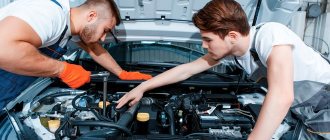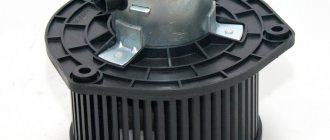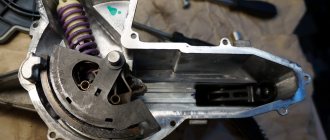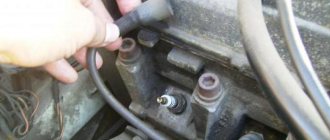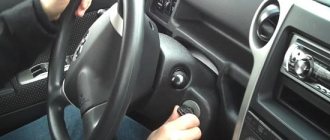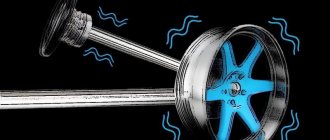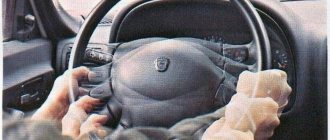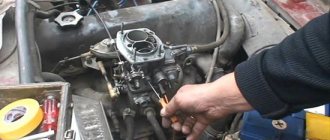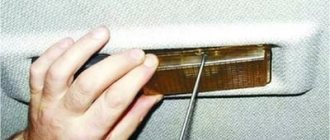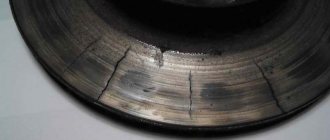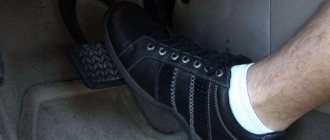The grinding noise constantly intensifies and is quite sharp.
One of the most common situations in which you will need to use the help of specialists at a service station is an increase in grinding or a sharp, strong sound of metal rubbing against metal. Most likely, the block is completely worn out; you continue to brake with the sole of the block, which is made of hard metal. If this problem is not addressed promptly, the brake disc may fail and require replacement. In this case, repairs will be three times more expensive, so it is better to immediately identify all possible malfunctions and problems that caused the grinding noise when braking. In particular, to diagnose this problem, it is enough to carry out the following processes:
- determine from which side the grinding sound is heard, this will help you halve the amount of work required for diagnosis;
- remove the wheel that you suspect is making unpleasant sounds when braking;
- examine the exposed brake disc for grooves, chips and other problems with the working surface;
- look at the remaining layer of the brake pads, determine the degree of wear and the need for replacement;
- also examine the second wheel on this side, and best of all, examine the braking system on all wheels;
- Identify possible problems that could lead to squeaking and consult with specialists.
This will often help you determine the cause of the squealing noise when braking for free, but disassembling the brake system and performing repair work yourself is not always wise. You can use the services of specialists and guarantee the normal operation of the brake system. However, it is quite possible that all braking systems visually appear to be in good working order, but the grinding noise is still present. Then see if the car's behavior has changed during braking. If there are changes, you will have to pay more attention to this problem. If there are no changes, you can continue to operate the car until the grinding noise intensifies and gives specific clues.
What can make such sounds?
Troubleshooting can create certain problems, since first of all it is necessary to determine in which wheel such sounds occur. The second difficulty is that when rotating a suspended wheel by hand, it is not always possible to identify the source of the unpleasant sound, and sometimes even when the gear is engaged there is no hint of a problem. In such cases, you should act by elimination, that is, carefully check all the details of this unit without exception.
Poor quality pads, discs or uneven wear of elements
Brake pads and discs are consumables for a car, so car owners often purchase and replace these components on their own. Purchasing spare parts does not always happen from official suppliers; original parts are often unreasonably expensive. Therefore, we expose ourselves to certain risks by purchasing analog parts or spare parts of unknown origin. In this case, a huge set of problems is possible, which will become the main cause of problems and squeaks in the braking system:
- incorrect composition and insufficient softness of the metal in the working part of the brake pads;
- poor quality of metal in brake discs, lack of required strength and rapid wear;
- uneven wear of discs and pads, which causes ineffective braking and problems with automation;
- consumables fail too quickly, unexpected braking problems;
- poor efficiency and strong heating of discs and pads during friction, problems with the entire braking system;
- other classic problems when installing non-original equipment for your car.
These are the types of problems that can be caused by installing non-original pads and discs. This does not mean that you should necessarily spend money only on original parts, but you should not buy spare parts from an unknown manufacturer. It is better to increase maintenance costs and get high quality work of all machine components than to have problems with transport and with the main safety devices. By the way, if braking is ineffective and there are problems with the elements of this system, ABS and other safety devices also do not work. This makes the car defenseless against some types of obstacles, as well as when attempting emergency braking.
Causes of squeaks
In the last century, antifriction material was attached to the base of the pad with rivets, the heads of which were recessed into the lining to a certain depth. When critical wear occurred, the metal of the rivet rubbed against the disc, producing a creaking sound. It served as a sure sign that the linings had thinned to a minimum and needed to be replaced.
Nowadays, the fastening of anti-friction elements is done in a more technologically advanced way, so friction of the rivets on the disks and drums is eliminated. There are several common reasons why modern brake pads squeak when you press the pedal:
- Natural wear of the working surface.
- Unevenly worn brake drum or disc, presence of deep scratches.
- Incompatibility of the material or coating with the system of a particular vehicle.
- There are no special grooves or curves to prevent the occurrence of grinding noise. Other design features.
- Wear of certain parts of the vehicle's chassis - calipers, guides, pistons and wheel bearings.
A secondary cause of squeaks at the front of the car is the ingress of water, dust, dirt and process fluids onto the working surface of the disc. The latter include various oils and brake fluid leaking from under the soggy cylinder cuffs.
Drum systems are better protected from external influences, but transmission oil from the rear axle gearbox often penetrates there when the oil seal is worn out. The malfunction can be easily traced by drips on the inner plane of the rear hub.
A harmless grinding sound - when can you ignore the sounds?
If extraneous sounds in your car are simply caused by poor quality pads, it is better to immediately change this element and not wait until the pads completely fail. But if good pads contain inclusions of harder metal, this feature is not dangerous for the discs. You can safely continue to operate the car. Only in the event of a sudden change in the behavior of the car when braking and in some cases, when the grinding noise begins to annoy with its intensity, can you consider replacing the pads and discs. Otherwise, it is enough to make sure that the nature of the sound is as follows:
- simply functional features of the working part of the pads, which contain unknown elements;
- the brake disc is not factory, which caused its rapid wear and grinding when braking;
- The grinding noise goes away after intensive pressing of the brake pedal;
- the creaking or other sound is not too annoying, it does not get louder and does not interfere with a normal trip;
- with the windows closed, you can hardly hear the squeaks of the brake system in the cabin, there is no extraneous sensation on the pedal;
- after 10-15 thousand kilometers the squeak disappears or noticeably subsides.
In other cases, it is worth paying more attention to the nature of the grinding noise when braking. If the grinding noise means your brake system is beginning to fail, you should take action quickly and save yourself a lot of money. If you delay the repair, you will have to change all the pads, all the discs, as well as other braking systems that may stop performing the necessary functions due to too much heating. It is also important to contact a good technician who can examine the entire braking system, conduct high-quality diagnostics and find other problems. This will allow you to return your car to normal operation. We suggest looking at information about pad wear and squeaking in the front suspension on a Chery QQ car:
Loud noise when braking
A strange strong sound appeared when braking and simultaneously turning the steering wheel. Not always! That is, no. When the brake pedal vibrates in time with the crackling noise. Not like abs, but similar and much stronger. It's getting scary. The pads are new, good Japanese ones)) After the replacement everything was ok. But then 1000 km and... The car brakes well. Has anyone encountered something similar?
Last edited by rozfeel; 06/16/2010 at 21:31.
So what is the sound when braking? Is there a crackling sound in the title of the topic, or is there some kind of sound? or does the pedal hit when braking, that is, when you press it, does it move back and forth? Probably the brake discs are still weak, when braking at speed there is no vibration on the body and pedals? or look at the disk protection, you can draw it somewhere but there is no vibration from it
And fill out your profile completely
The cracking sound is like “tr-r-r-r-r”. Strong. And the beating in the pedal is not just noticeable, but strong. There was no speed. Only when I turned the wheels a little and the speed was not high. Those. I had to slow down when turning and then it was like “tr-tr-tr-tr-tr.” And as I said, this is not a rule. Those. the sound is there or not.
I don’t know if this is related or not, but recently when braking to a complete stop there was a strange sound coming from under the hood. It’s as if something is moving out of place, like a grinding noise, but not quite. The sound was not strong but noticeable. Everything is secure under the hood))
If the brake disc is worn, does it need to be bored? Or is it all bullshit and should I buy new ones? I'm going to remove the wheel, when time comes, will there be any external changes on the disk or will I not see anything? Thank you.
rozfeel
, the sound TR-TR-TR and hitting the pedal is the ABS is triggered. If it works when you press the pedal lightly, then it seems like you need to look at the combs and check the sensors. As for the brake discs, you can sharpen them if the wear is not large, but if the wear is large, it is better to buy new ones.
Not ABS, that's for sure. I know how ABS works - easy trrr. And here it’s 10 times stronger and a little bit the frequency of a friend.
Addition: Now I braked in a straight line hard until it stops and until it stops completely. Just before stopping from 5 km/h to 0, there is a grinding sound from the front, the sound is different from what I described: there is no beating on the pedal and “krrrr” instead of “tr-tr-tr-tr”. )) But there seems to be one reason. I looked at the discs 1000 km ago, they were still very good, and I changed the pads with professionals, they would have told me. But apparently they are. What else?
Let's sum it up
High-quality brake operation in a car is one of the most important features of a safe trip. If operating the machine causes certain difficulties or discomfort in terms of braking, you should immediately contact a service station and solve the problem. Otherwise, you may encounter unpleasant situations when braking turns out to be ineffective at a difficult moment and cannot provide the necessary operating features. Considering the importance of the braking system for safety, it is better not to joke with this unit and do all the work on time. Creaking and grinding noises can occur if you do not comply with the manufacturer's important car maintenance requirements.
Simply replacing your brake pads when squeaking begins can save you money, time, and keep you safe. To completely avoid trouble, it is enough to carry out the inspection on time and respond to all unpleasant manifestations. The behavior of the car, as well as the sound effects of problems, can also be an important point in diagnosing the car. Often these moments are an important harbinger of problems. What do you do if your car starts making any unnatural noises?
Advertisements on NN.RU - Auto
Wide selection of hydraulic pumps and hydraulic motors of all series. Axial piston hydraulic motor. Splined shaft, reverse rotation. Analogs - (many. Price: 1,000 rub.
The company offers you to upgrade the Fiat Ducato Fiat Ducato basic version for a solution.
Lengthen Kamaz under a body 7.5 m Lengthen Maz Zubrenok, Maz under a body 9 m Re-equipment of the chassis of an extended truck.
A specialized company for the conversion of trucks produces extensions for man man, iveco and iveco truck tractors.
The eternal joke that truly useful things are not taught in schools is not such a joke: figuring out how to return taxes, for what.
The weather this weekend will not be very pleasant: summer warmth has not yet returned to our region. But neither are cold temperatures with heavy rains.
Today, Nizhny Novgorod fast food lovers have a real holiday: a new worldwide outlet has opened on the renovated Nizhne-Volzhskaya embankment.
Imagine, you wake up in the morning, open the curtains, bright sunlight bursts into your apartment, and outside the window is a stunningly beautiful landscape.
Some earlier, and some a little later, but almost all drivers are interested in the question of why there is a creaking sound in the rear wheel when driving. This will be especially interesting for drivers of relatively new cars, when they drive without unnecessary sounds, knocks, and suddenly an ear-piercing squeak appears in the areas of the rear wheels.
They act in such situations differently, some stop and start rushing around their car, while others act on the principle that a good squeak will come out.
Why there is a creaking sound in the rear wheel when driving, we will consider with you for different car models and situations that arise. Since such a problem can arise at any time, far from service points and technicians, it will be useful for all owners to know about the possible manifestations of such a problem. This will help you correctly navigate the situation and take appropriate measures.
Most common problems
Braking
Since squeaking brakes when braking is one of the main complaints associated with this problem, a whole range of measures is needed to diagnose and eliminate the defect. It is necessary to identify the side that is squeaking, remove the wheel and evaluate the condition of the brake pads.
Measure the runout of the brake disc, the presence of a service groove and, if necessary, grind (on a special machine - stand) or replace the brake discs (if there is a malfunction, a pair of brake discs is always replaced).
Check the presence of metal anti-squeak plates and their condition, make sure that there are no foreign objects in the brake and wheel mechanism, and also evaluate the condition of the suspension and brake caliper parts.
If after checking there is still a squeaking sound when driving, then most likely there is a mismatch in materials, and you should simply replace the brake pads.
Rear brakes
There are many cars with rear drum brakes, and although the design of the brakes is different, the principle of checking and repairing is approximately the same. The rear brakes are used as a parking brake, and sometimes the rear brakes squeak due to the need to simply adjust the handbrake.
When driving
This usually happens when the wheel bearing wears out or the brake disc is bent, when axial vibrations occur. The brake disc reaches the pad and causes vibrations, heard as creaking, squeaking, and so on. Usually eliminating the backlash and replacing parts (discs and pads) eliminates the problem.
Brake pedal
Braking system defects can also include squeaking brake pedal. Such a squeak usually indicates increased friction on the pedal axle. This can have a critical impact on vehicles equipped with ABS, as increased pedal resistance may adversely affect performance. It can be easily eliminated by simply lubricating the bushings and axle with a suitable lubricant.
If, after all the work and activities, the squeaking noise does not go away when you press the brake pedal, you need to turn to professionals, since the braking system is a complex mechanism responsible for safety and even such a small thing as a squeaking sound should not be ignored.
What else could squeak?
Modern cars have disc brakes on the rear axle, which does not eliminate noise. In some cases, the use of counterfeit pads may be the source of these sounds. There may be solid particles in the friction material of the pads, which will cause squeaking.
There are products in which a special layer of material is installed; when it comes into contact with the brake disc, it emits a signal notifying the driver of the need to replace the pads. Sometimes such sources can be the guide bushings of the brake cylinders of disc brakes. In this case, you need to clean them of oxides and lubricate them with anti-squeak grease.
Fans of driving in extreme conditions are faced with the problem of overheated brake discs. In the case when their thickness approaches critical, they can “lead”, which will also lead to the appearance of unpleasant sounds.
We tried to explain in accessible words the reasons why there is a creaking sound in the rear wheel when driving. Of course, these are not all possible sources of its occurrence, but knowing the search algorithm, you can gradually find the problem and eliminate it.
Principle of operation
All hydraulic brake systems operate on the same principle:
When you press the brake, the pressure in the brake hydraulic system increases, the brake calipers, through the pistons, press on the brake pads, which are pressed against the disc or drum and, due to the frictional force, slow down or stop it. The pressure (of the calipers) in the brake system directly depends on the force of pressing, that is, on the distance that the brake pedal has traveled. In other words, by pressing the force, you can regulate the pressure and change the braking torque, that is, slow down, or vice versa, with full pressure, you can brake urgently.
The source of unpleasant, extraneous sounds in the brakes can only be moving parts:
- pads (front and rear);
- caliper (piston);
- brake discs or drums (deformation);
- brake pedal (lubrication);
- wheel hub (play);
